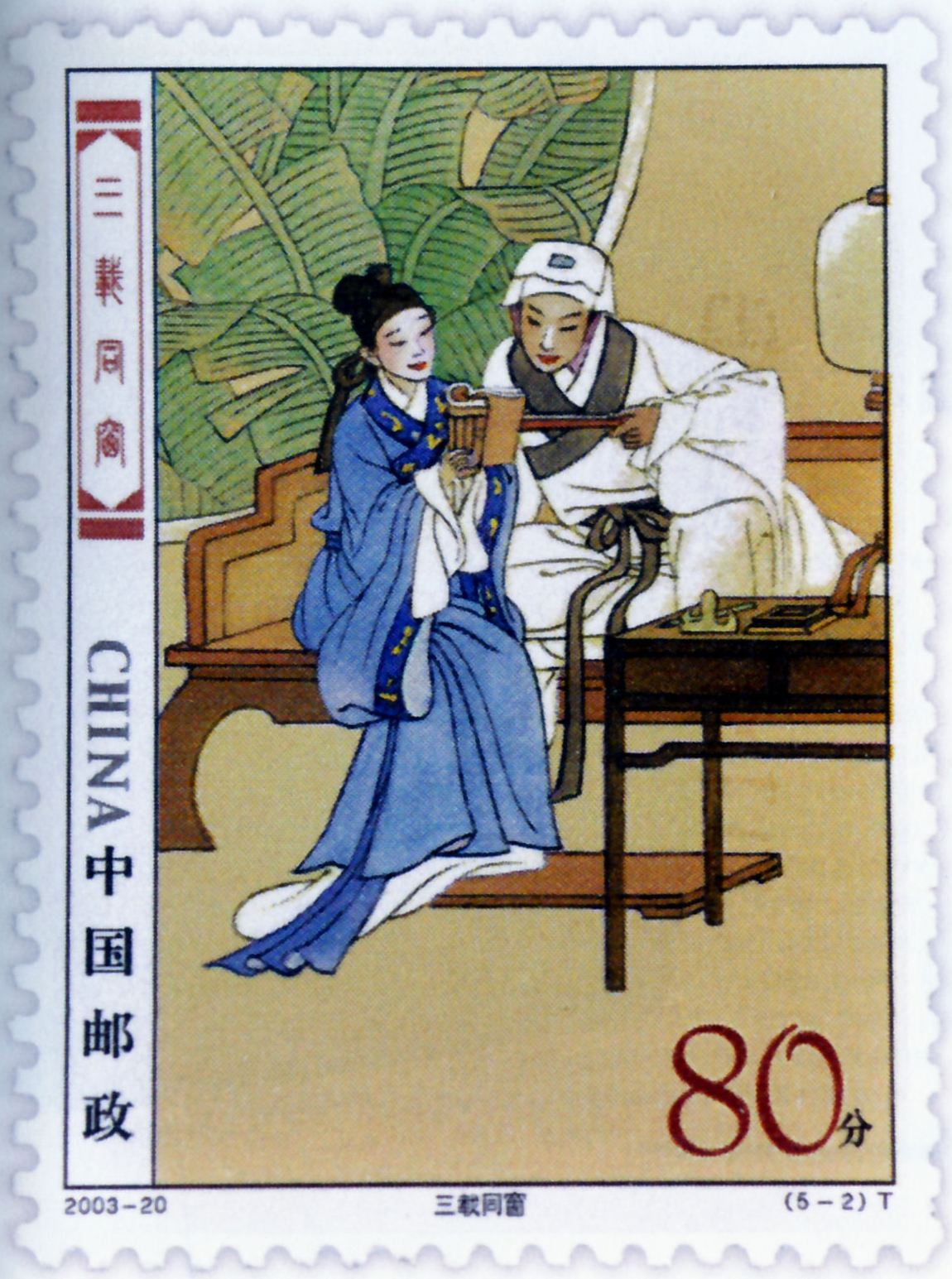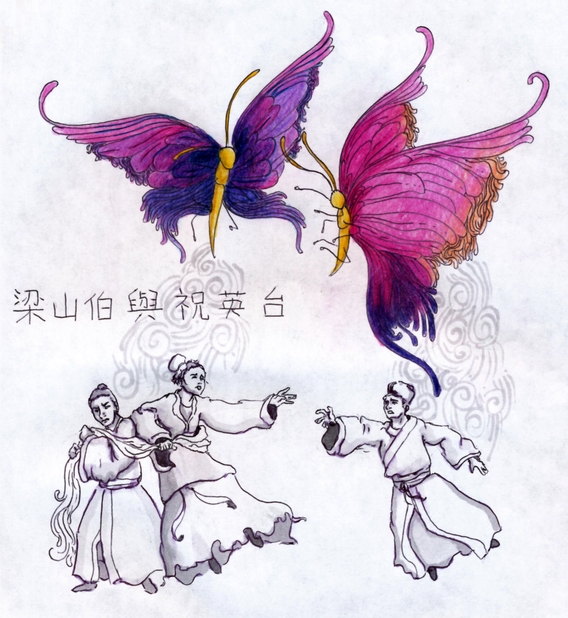
“Three happy years passed, and the two friends were inseparable.”
(PRC Postage Stamp, 2000)
LIÁNG Shānbó 梁山伯 = a handsome young scholar
ZHŪ Yīngtái 祝英台 = a beautiful maid keen on scholarship
Father Zhū 祝 = her father, sympathetic to schooling but not to boyfriends
MǍ Wéncái 马文才 = the school bully
LIÁNG Shānbó 梁山伯 was a handsome young scholar, who, with his servant, was on his way to study at the famous Academy of Ten Thousand Pines (Wànsōng Shūyuàn 万松书院) in Hángzhōu 杭州.Like all academies, it admitted only men.
ZHŪ Yīngtái 祝英台 was a beautiful maid who wanted to learn the scholarly arts. So, with her father’s grudging permission, and despite his deep misgivings, she and her maid disguised themselves as young men and set out for the same famous academy at Hángzhōu. But as they traveled along the road, Zhū Yīngtái’s horse suddenly shied, and nearly threw her into the mud. As the two women struggled to bring the animal under control, Liáng and his servant came riding up and assisted them.
Within no time the four “young men” were happily traveling together. Liáng and Zhū got on wonderfully, and Liáng suggested that they become sworn brothers, which they did, vowing eternal mutual support.
Three happy years passed, and the two friends were inseparable. School life was delightful, and both of them learned a great deal and enjoyed the company of their fellow scholars, except for a certain MǍ Wéncái 马文才. Mǎ Wéncái was the indulged son of a high official of great wealth. Together with some brutish comrades, he made life miserable for other students whenever he had an opportunity to do so.
Sometimes Zhū Yīngtái hinted to Liáng Shānbó that she loved him, for she really wished they could be more than “brothers” to each other, but she never dared do more than hint, and as time passed it seemed ever more awkward to admit she had been deceiving him all along and was really female. And for his part, Liáng, pure of heart but curiously obtuse, never imagined that she was female.

One day a letter came to Zhū Yīngtái announcing that her mother was sick and that she needed to return home immediately. Zhū was horrified at the idea of separation from Liáng Shānbó, but then she hit upon an idea. She told him she had a twin sister who looked just like her, except of course for being female, and she proposed to introduce them. She made him promise to come to visit in two months to meet “Sister Zhū.” At that time, she reasoned, she would be free to appear as a woman, and, after his initial surprise, he would surely find that his love for her would become less “brotherly.”
On reaching home, Zhū Yīngtái discovered that her mother was in good health. The message about her illness had merely been a ruse to get Yīngtái to return home to be married. Worse yet, the man selected to be her husband was none other than the hated Mǎ Wéncái, the bully from the academy.
Her father thought the match would unite the two families and help ensure their continuing prominence. He knew, of course, that she had been attending the academy disguised as a boy, for he had agreed to that, however reluctantly. But he had never even remotely imagined that she would develop any romantic attachments. (Liáng Shānbó was not alone in being obtuse.)
Zhū Yīngtái’s father was furious when Yīngtái said she had already fallen in love with another man. Selecting mates, after all, was a job for parents, assisted by matchmakers perhaps, but it was certainly not the business of brides-to-be. Indignantly, he received the wedding gifts from the Mǎ family and ordered Yīngtái to cooperate in the marriage. Plans for the wedding advanced slowly, resisted by Zhū Yīngtái in every way she could think of.
After two months Liáng Shānbó came to visit, eager to meet the sister of his beloved sworn brother. Almost immediately the truth emerged, and he learned that Yīngtái was herself the “sister,” and that she had been disguised as a man in order to study. And she was in love with him. Liáng Shānbó’s affection for his “sworn brother” immediately was transformed from brotherly affection to desperate love for Zhū Yīngtái and a desire to marry her. All this was just as Zhū Yīngtái had planned.
But there was a second surprise for him, an unfortunate one: She was unwillingly engaged to Mǎ the bully.
Father Zhū would of course hear nothing of her marrying Liáng Shānbó. Mǎ was rich. Liáng was not. And that made all the difference in the world. Furthermore, the decision had already been made and the family had already accepted marriage gifts from the Mǎ family, so the arrangement was effectively finalized.
Father Zhū had Liáng Shānbó thrown into the street. Some people say he had Liáng beaten first, so that he died shortly thereafter. Others say Liáng stopped eating and died of a broken heart. Whatever the truth, he was soon dead.

Giving in to her father’s iron will, Zhū Yīngtái finally agreed to marry Mǎ Wéncái, but on condition that she be permitted to wear white (the color of mourning) under her red wedding gown and pay her respects at Liáng Shānbó’s grave en route to the Mǎ household. The proposal would normally have been outrageous, for contact between a wedding procession and any symbol of death is very ill-omened. But Mǎ consented, hoping it would help calm her down (which she seemed to need). And at length she had permission.
So the wedding procession paused near the grave, and Zhū Yīngtái was allowed to go to it and pay her respects. She in fact did more than that. She sobbed and sobbed.
Suddenly the tomb burst open, exposing the body of Liáng Shānbó. Zhū Yīngtái threw herself upon it, and in a blinding flash of light Liáng Shānbó and Zhū Yīngtái were transformed into two magnificent butterflies, who fluttered up from the grave and flew away into the sky. All who witnessed this miracle then realized the power of true love.
[The version of the story retold here is based in part upon a dance adaptation presented by the Shanghai Ballet (Shànghǎi Bāléiwǔ Tuán 上海芭蕾舞团) in San Diego in June, 2007.]